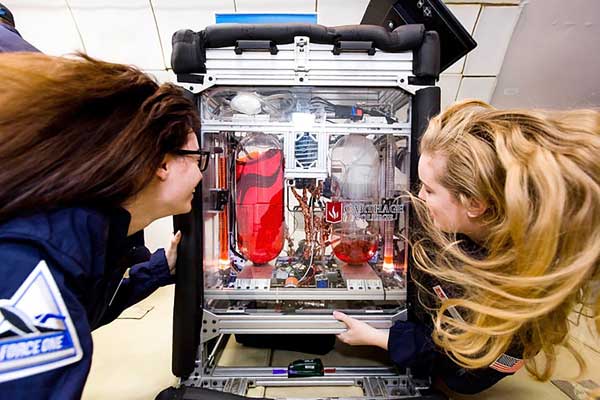
NASA Flight Opportunities Program Update
Modal Propellant Gauging (MPG)
What It Is
MPG is a non-invasive, inexpensive, robust method designed to gauge settled and unsettled liquid propellant at gauging resolutions of 1% for settled propellants and 2-4% for unsettled, sloshing propellants.
Why It Matters
MPG is designed to address the needs of NASA’s Space Launch System (SLS)/Orion architecture. SLS/Orion requires in-space gauging accuracy of 1% for remaining propellant mass and leak detection.
Suborbital Flight Milestones
Flights on Zero Gravity Corporation’s G-FORCE ONE and Blue Origin’s New Shepard have enabled researchers to:
- Demonstrate MPG’s ability to gauge at resolutions of 1% for settled propellant and 2-3% for unsettled, sloshing propellant
- Validate a computational fluid dynamics model of how modal gauging is affected by propellant slosh and other vehicle dynamics
- Develop models of the slosh dynamics of the Orion service module propellant tanks
What’s Next
As a result of suborbital flight testing, Carthage College has achieved several commercialization successes with MPG:
- Airbus has adopted MPG for a one-year study as part of its zero-emission commercial passenger jet program. The project is the culmination of a project for which five Carthage College undergraduates won the Lemelson-MIT Prize in 2020.
- Seattle startup GeoJump is commercializing MPG for use on its Sherpa-class spacecraft via a Small Business Technology Transfer grant with the U.S. Air Force.
- NASA Commercial Payload Services (CLPS) contractor Intuitive Machines has installed the MPG technology on its NOVA-C lunar lander test articles.
“I’m grateful for the support from both Flight Opportunities and Zero Gravity Corporation over the years. Our recent successes show that all of this work is starting to translate into tangible results,” said Kevin Crosby, Ph.D., principal investigator for MPG at Carthage College.

